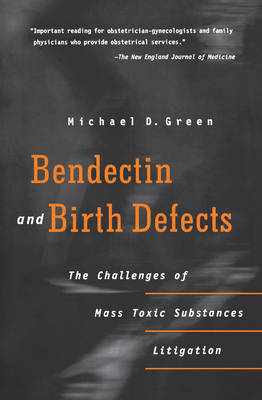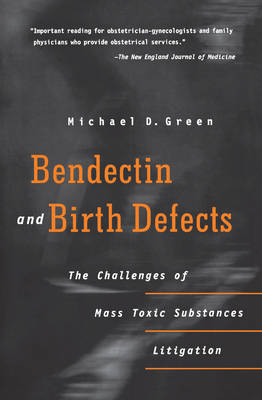
Bedankt voor het vertrouwen het afgelopen jaar! Om jou te bedanken bieden we GRATIS verzending (in België) aan op alles gedurende de hele maand januari.
- Afhalen na 1 uur in een winkel met voorraad
- In januari gratis thuislevering in België
- Ruim aanbod met 7 miljoen producten
Bedankt voor het vertrouwen het afgelopen jaar! Om jou te bedanken bieden we GRATIS verzending (in België) aan op alles gedurende de hele maand januari.
- Afhalen na 1 uur in een winkel met voorraad
- In januari gratis thuislevering in België
- Ruim aanbod met 7 miljoen producten
Zoeken
Bendectin and Birth Defects
The Challenges of Mass Toxic Substances Litigation
Michael D Green
Paperback | Engels
€ 69,45
+ 138 punten
Omschrijving
Benedictin was prescribed to more than thirty-five million American women from its introduction in 1956 until 1983, when it was withdrawn from the market. The drug's manufacturer, Merrill Dow Pharmaceuticals, a major U.S. pharmaceutical firm, joined a list of other companies whose product liabilities would result in precedent-setting litigation. Before it was over, the Benedictin litigation would involve 2,000 claimants over a fifteen-year period. Michael D. Green offers a comprehensive overview of the Benedictin case and highlights many of the key issues in mass toxic substances litigation, comparing individual and collective forms of litigation, and illustrating the misunderstandings between scientists and lawyers about the role of science in providing evidence for the legal system.
Specificaties
Betrokkenen
- Auteur(s):
- Uitgeverij:
Inhoud
- Aantal bladzijden:
- 384
- Taal:
- Engels
Eigenschappen
- Productcode (EAN):
- 9780812216455
- Verschijningsdatum:
- 1/01/1998
- Uitvoering:
- Paperback
- Formaat:
- Trade paperback (VS)
- Afmetingen:
- 150 mm x 226 mm
- Gewicht:
- 521 g

Alleen bij Standaard Boekhandel
+ 138 punten op je klantenkaart van Standaard Boekhandel
Beoordelingen
We publiceren alleen reviews die voldoen aan de voorwaarden voor reviews. Bekijk onze voorwaarden voor reviews.









